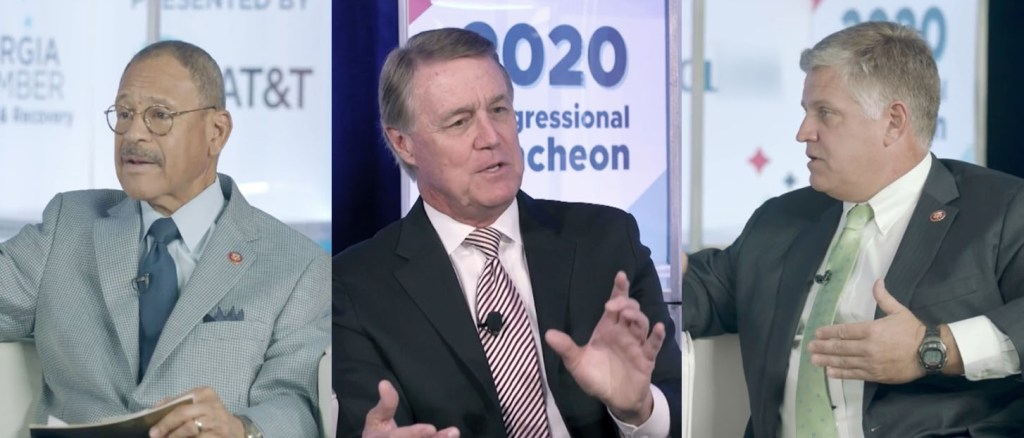Georgia congressmen echo debate on unemployment benefits
Published 1:00 pm Thursday, August 13, 2020

- Georgia Congressmen U.S. Reps. Sanford Bishop and Drew Ferguson and U.S. Sen. David Perdue take part in panel discussions during the Georgia Chamber of Commerce Congressional Luncheon held virtually on Aug. 11.
ATLANTA — In a glimpse into the national debate playing out in Washington, D.C., Georgia congressmen debated Tuesday whether or not extending additional unemployment benefits will help or hurt the state’s economy.
As part of the initial COVID-19 relief package, people receiving state unemployment dollars were given an additional $600 of federal money in their unemployment checks.
From the end of March to the beginning of this month, unemployed Georgians received more than $8.3 billion from the federal weekly supplements, according to the Georgia Department of Labor.
But after the extra financial boost from the government expired at the end of July, federal lawmakers can’t agree on whether or not to re-up the benefit.
Republicans argue out-of-work Americans may be making more off unemployment than a regular salary — discouraging them from going back to work. Democrats uphold that many are still afraid of contracting COVID-19 in the workplace.
The pandemic has caused a tidal wave of unemployment in the Peach State and across the country. Georgia’s unemployment rate hit a high of nearly 12% in April — the rate still hovers at around 11%. As of July, the state has processed more than 3.3 million claims — more than the last eight years combined, according to the department.
During a virtual congressional luncheon sponsored by the Georgia Chamber of Commerce, U.S. Reps. Sanford Bishop and Drew Ferguson discussed the disagreement in Washington, D.C.
“People are at home, they’re out of work. There are some people who were eligible and were not getting the unemployment,” Bishop said. “The extended unemployment of $600 extra was very, very helpful because people who are at home … they still have their mortgage payments, they still have their rent payments and they still have to put food on the table for their families.”
The Democrat noted while spending more time at home, Georgians are likely spending more money on groceries and utilities. With Congress in a stalemate regarding the next round of COVID-19 relief legislation, he said unemployed individuals are relying more on food assistance programs which are overwhelmed.
“We’re at a very, very serious crisis stage. Congress needs to act — the American people need us to act,” he said. “Otherwise, we will have just suffering, upon suffering, upon suffering. People are suffering now, but it’s going to be dramatically worse if Congress does not come together and do something.”
Ferguson said it is “important that we don’t incentivize people to sit on the sidelines” as the national and state economies start to reopen.
“I don’t think most Americans would agree that paying people more to stay at home than they were actually making on their paycheck is an incentive to go to work,” he said.
The Republican congressman said companies are having a hard time bringing employees back after reopening their doors.
“Not because of fear,” he added, “but because they’re making more on unknown enhanced unemployment than they are reentering the workforce.”
Senior U.S. Sen. David Perdue — who faces an expected close race in November — said the election year is likely playing a part in the frozen relief negotiations.
“I’m hopeful but I’m not optimistic that we’ll actually get a comprehensive deal done,” he said Tuesday. “But we need to.”
U.S. Rep. Doug Collins, a high-ranking member of the House Judiciary Committee and U.S. Senate hopeful, told CNHI during a candidate interview that the government “needs to move away” from additional unemployment benefits.
“It is keeping us from our economic recovery,” he said. “Because many people were making more, unfortunately, the unemployment help that was being given from the federal government, than it was to go back to work.”
President Donald Trump signed an executive order Aug. 8 that extended additional federal supplements that expired but decreased the amount to $400 per week. The new system could take states weeks to implement and 25% is required to come from states.
The high number of unemployed Georgians has depleted the state’s Unemployment Trust Fund. In a July 24 letter to U.S. Labor Secretary Eugene Scalia, first reported by the Georgia Recorder, Gov. Brian Kemp asked for a $1.1 billion loan from the federal government to help offset the dwindling state funds.
At a press conference Monday, Kemp said state officials are still trying to hash out the details of what Trump’s executive order would mean for Georgia.
‘We’re digging in on that issue. Personally, I appreciate the president’s action,” the Republican governor said. “We’ve all seen the gridlock in Congress before a November election before — and I think that’s what’s happening now. So I certainly want to applaud the president for taking action to help hard-working American citizens as well as Georgians. What that looks like on the unemployment, our team’s talking to Commissioner Butler right now.”
Kersha Cartwright, spokeswoman for the department of labor, said Wednesday leaders are still unsure of what the executive order could mean for the department. The $100 match from the state, she said, would potentially come through the Georgia Emergency Management Agency which is controlled by the governor’s office.
“We’re still waiting on guidance at this point,” she said. “We really don’t know how long it’s going to take to implement, what it’s going to mean for us, what that will mean financially — there’s too many things that are still up in the air.”
But not all Georgians may be eligible for the extra $400. In the order, only those who receive more than $100 a week in benefits are eligible for the federal boost. Anyone who was earning at least $1 of unemployment benefits was eligible for the since expired $600 supplement payment.
Critics say Trump’s plan would leave out the country’s lowest-paid workers and could possibly face legal challenges over whether or not the president has authority to carry out the program.
State labor departments have been trying to keep up with changes to the system which often requires entirely new programming on the back end.
Mark Butler, Georgia Department of Labor commissioner, told CNHI in April that federal lawmakers have thrown state labor departments “to the wolves” to create systems that never existed before the pandemic.
Cartwright said that any change, including the new $400 supplemental payments, is going to be another heavy lift for the department.
“That’s going to require some programming on our side that’s not an easy fix,” she said. “… It’s going to be a challenging ask.”





